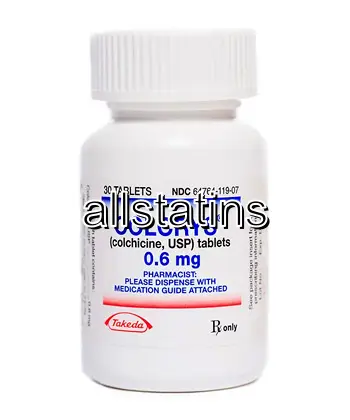Buy Colchicine Online in Australia
| Package | Dosage | Price | Price per Dose | |
|---|---|---|---|---|
| Dosage: 0.5mg | ||||
| 360 pill | 0.5mg | AUD443.06 | AUD1.22 | |
| 180 pill | 0.5mg | AUD242.46 | AUD1.35 | |
| 120 pill | 0.5mg | AUD181.82 | AUD1.53 | |
| 90 pill | 0.5mg | AUD151.51 | AUD1.68 | |
| 60 pill | 0.5mg | AUD128.17 | AUD2.14 | |
| 30 pill | 0.5mg | AUD104.85 | AUD3.48 | |

Colchicine Description
What is Colchicine?
Colchicine is a medicine derived from the autumn crocus. It is used as an anti‑inflammatory, but it is not a typical pain reliever. In an online pharmacy review you will find it offered mainly in small 0.5 mg tablets. The substance has a long history in clinical practice and is valued for its rapid action in some conditions. Its use, however, requires careful dosing and medical supervision due to a narrow safety margin and potential drug interactions.
How Colchicine works
The drug works by interfering with the movement and function of inflammatory cells. By disrupting microtubule formation in cells, it reduces the activity and migration of neutrophils to inflamed tissues. This helps limit swelling and pain during gout flares and can modulate fever episodes in certain hereditary inflammatory diseases. It is not a general painkiller and often needs to be timed precisely with symptom onset or preventive therapy in mind.
Indications and everyday use
Colchicine is commonly used to treat an acute gout attack and to prevent recurrent gout episodes when urate-lowering therapy is started. It also has a role in familial Mediterranean fever and in some forms of pericarditis when prescribed by specialists. In an online pharmacy setting you may see guidance on short‑term use for flare relief and longer‑term use for prevention. The right choice depends on your health history, kidney function, and other medicines you take.
How to take Colchicine safely
Always follow a clinician’s instructions or the dosing printed on the label. Dosing can vary by condition and patient factors. Take tablets with water, preferably with meals to reduce stomach upset. Do not crush or break tablets unless the label explicitly allows it. Keep a consistent schedule and avoid missing doses. Tell your pharmacist about all other medicines you use, as some drugs can raise the risk of serious side effects or interactions.
Possible side effects and cautions
GI side effects are the most common, including diarrhea, nausea, and abdominal pain. These are usually mild but can be significant in some people. More serious but rare effects include muscle pain or weakness, numbness, unusual bleeding, or signs of liver or kidney stress. Colchicine interacts with certain antibiotics, antifungal drugs, and cholesterol medications, which can increase toxicity risk. Seek medical help for severe diarrhea, unrelenting vomiting, chest pain, or confusion, and avoid alcohol if advised by your doctor.
Storage, quality and pharmacy tips
Store Colchicine tablets in a cool, dry place away from light. Check packaging and expiry dates before use. Buy only from licensed pharmacies to ensure product authenticity and proper labeling. If you have kidney or liver disease, inform the pharmacist, as dose adjustments may be needed and regular monitoring might be advised.
Bottom line
Colchicine remains a valuable option for specific inflammatory conditions when used with care. It can provide quick relief in certain gout scenarios and prevent recurrences when prescribed for prevention. Its success hinges on correct dosing, awareness of interactions, and ongoing medical supervision to keep safety at the forefront of therapy.
